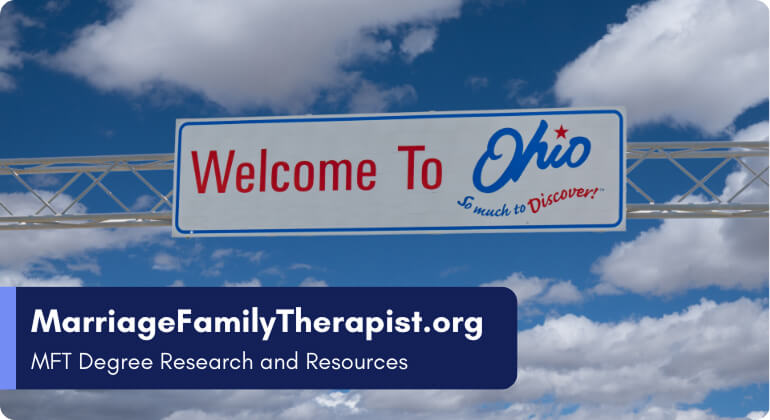Marriage & Family Therapy (MFT) Degree Programs in Ohio 2025
Ohio provides several accredited Marriage and Family Therapy (MFT) programs, ensuring that students receive rigorous clinical training and meet state licensing requirements. With growing demand for licensed therapists in hospitals, community clinics, and private practice settings, Ohio offers strong career opportunities for LMFTs across the state.
In this guide
MFT Programs Available in Ohio
Ohio has several COAMFTE-accredited and regionally approved MFT programs, ensuring that students receive comprehensive training and preparation for licensure.
Top Accredited MFT Programs in Ohio
The University of Akron – Master of Arts in Marriage and Family Therapy
- COAMFTE-accredited program focused on systemic therapy and evidence-based counseling techniques.
- Provides internship placements in diverse mental health settings, ensuring students gain hands-on experience before graduation.
Prepares graduates for LMFT licensure in Ohio, helping them transition smoothly into clinical practice.
Ohio State University – MS in Human Development & Family Science with MFT Specialization
- Offers a strong foundation in family therapy research, mental health intervention, and ethical counseling practice.
- Emphasizes multicultural therapy approaches and includes practical training opportunities in school-based, hospital, and private practice settings.
Ohio’s Quickest MFT Programs
- The University of Akron’s MFT program can be completed in two years, with early internship placements to expedite clinical training.
- Ohio State University’s MFT specialization offers a structured two-year curriculum, including practicum and internship opportunities to meet state licensure requirements.
- Online and hybrid MFT programs from accredited institutions allow students to accelerate coursework while completing clinical hours in Ohio.
- Some universities accept transfer credits from related graduate programs, allowing students to shorten their degree completion time.
For students looking to earn their MFT degree in the shortest time possible, enrolling in full-time programs with early clinical experience is key.
Ohio’s Cheapest MFT Programs
- The University of Akron offers one of the most affordable COAMFTE-accredited MFT programs, making it an excellent choice for budget-conscious students.
- Youngstown State University provides financial aid and graduate assistantships, reducing tuition costs for qualifying students.
- State and federal loan forgiveness programs are available for LMFTs who work in rural or underserved mental health settings, making MFT education more financially accessible.
- Online programs may provide lower tuition rates and flexible payment plans, making them a viable option for students balancing work and school.
For students seeking a cost-effective MFT education, applying for scholarships, assistantships, and loan repayment programs can help reduce tuition expenses and student debt.
How to Become Licensed as an LMFT in Ohio
1. Earn a Master’s or Doctorate in Marriage and Family Therapy
- Complete an MFT or related mental health graduate program that aligns with Ohio’s licensing standards.
- Ensure coursework covers family therapy models, mental health assessment, ethical practices, and trauma-informed care.
2. Complete 3,000 Hours of Supervised Clinical Experience
- Fulfill post-graduate clinical hours, including 1,500 hours of direct client contact under a licensed MFT supervisor.
- Work in approved therapy settings, such as mental health agencies, private practices, or school-based counseling programs.
3. Pass the National MFT Examination
- Take and pass the Association of Marital and Family Therapy Regulatory Boards (AMFTRB) National MFT Exam.
- Demonstrate competency in clinical techniques, ethical standards, and relationship counseling.
4. Apply for Licensure Through the Ohio Counselor, Social Worker, and Marriage and Family Therapist Board
- Submit official transcripts, proof of supervised hours, and exam scores for licensure approval.
- Complete any additional state-specific licensing requirements, such as background checks or ethics courses.
5. Maintain Licensure with Continuing Education
- Complete 30 continuing education (CE) hours every two years, including coursework in ethics, trauma-informed care, and specialized therapy techniques.
- Attend workshops, online training, and professional conferences to stay up to date with best practices in family therapy.
Following these steps ensures a smooth transition from student to licensed LMFT, qualifying professionals to work in private practice, behavioral health organizations, and school-based therapy programs.
LMFT Career & Salary Outlook in Ohio
Ohio offers strong job opportunities for LMFTs, with demand increasing in urban centers, rural communities, and telehealth services. The average salary for LMFTs in Ohio is $61,700 per year, with experienced professionals earning over $90,000 annually.
Where LMFTs Work in Ohio
- Private practice therapists in Ohio often earn higher salaries and have flexible work schedules.
- Community mental health centers and hospitals employ LMFTs for integrated behavioral health services.
- School-based mental health programs allow LMFTs to work with children, adolescents, and families in educational settings.
- Teletherapy expansion in Ohio provides additional job opportunities, allowing therapists to serve clients remotely while maintaining flexible work schedules.
With strong salary potential, growing demand for licensed therapists, and diverse work environments, Ohio is a promising state for LMFT professionals.
Ohio offers several high-quality MFT programs, structured licensure pathways, and expanding career opportunities for licensed therapists. With affordable tuition rates, flexible learning options, and employer demand, the state is an ideal location for aspiring LMFTs.
For students seeking a well-rounded, cost-effective, and career-driven MFT education, Ohio’s programs provide the clinical training, licensure preparation, and hands-on experience necessary to excel in private practice, community mental health, and behavioral health organizations. Whether working in urban therapy centers or supporting rural mental health initiatives, LMFTs in Ohio play a crucial role in strengthening family relationships and improving mental health outcomes across the state.


Related Articles
- From Student to Therapist: What to Expect in Your MFT Clinical Internship
- Support That Affirms: Navigating Mental Health as LGBTQ+
- Who Will You Treat as a Marriage & Family Therapist? A Career Guide for Aspiring MFTs
- LMFT vs MFT: Is Licensure Necessary for Your Therapy Career?
- The ROI of an MFT Degree: Analyzing the Financial Investment in Your Therapy Career
- MFT Doctorate Degrees: DMFT vs PhD – Who Should Pursue Each Path?